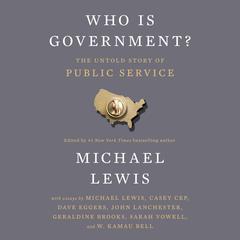 Play Audiobook Sample
Play Audiobook Sample
Next: The Future Just Happened Audiobook
 Play Audiobook Sample
Play Audiobook Sample
Quick Stats About this Audiobook
Total Audiobook Chapters:
Longest Chapter Length:
Shortest Chapter Length:
Average Chapter Length:
Audiobooks by this Author:
Publisher Description
In Liar's Poker barbarians seized control of the bond markets. In The New New Thing some guys from Silicon Valley redefined the American economy. Now, with his knowing eye and wicked pen, Michael Lewis reveals how the Internet boom has encouraged great change in the way we live, work, and think. He finds that we are in the midst of one of the greatest revolutions in the history of the world, and the Internet is a weapon in the hands of revolutionaries. The old priesthoods-lawyers, investment gurus, professionals in general-have been toppled. The amateur, or individual, is king: fourteen-year-old children manipulate the stock market; nineteen-year-old take down the music industry; and wrestlers get elected to public office. Deep, unseen forces seek to undermine all forms of collectivism, from the mass market to the family. Where does it all lead? And will we like where we end up?
Download and start listening now!
"Just finished this 2002 book today. It's 2013! Why read a book released in 2002 called NEXT? Amazingly, it just holds up and is packed with still-relevant and richly detailed reporting. If you didn't read it when it came out, read it now. If you read it in 2002, consider reading it again."
— Robert (5 out of 5 stars)
Awards
-
One of the 2001 New York Times Book Review 100 Notable Books for Nonfiction
Next Listener Reviews
-
" Lewis is one of the more entertaining business writers out there. His hands on experience as a trader at Salomon Brothers gives a unique "been there done that and know what I am talking about" type of perspective. His best writings are on financial markets - Liar's Poker, The Big Short - and his devastating portraits of Eurozone casulaties in Vanity Fair. Despite his abundant talents, he navigates less certain terrain when he writes about the world of high-tech. His New New Thing and The Future Just Happened are entertaining accounts highlight the bizarre and whacky shennanigans of the New Digerati. I confess to a distinct collegiate bias, preferring the musings of Stanford-bred authors Po Bronson and Guy Kawasaki. They were educated in Silicon Valley, grew up in the business and offer more insights with a tinge of that unique Stanford humor one observes in undergraduate life and in the antics of the Band. Lewis just isn't crazy enough to write the best copy about high tech, but nonetheless this is a decent read with stories about unique individuals cashing in on the new technology. "
— John, 1/18/2014 -
" This book was written in 2001, but the strongest praise I can offer it is that although the case studies (file-sharing, message boards, etc.) feel very quaint, the insights Lewis draws from them are still useful today. Not his best work, but not half-bad eiher. "
— Noah, 1/14/2014 -
" Listening to the unabridged audio version. Fascinating even though it reports on early 2000's "
— Fred, 1/9/2014 -
" The internet is changing the world, empowering the little guy and threatening the corporate structure. The book gathers several little guys to make the point that by making the availability of knowledge more democratic, some at the top will start to slip. "
— Ethan, 12/24/2013 -
" Lewis is queasy about the impact of technology, and communicates it in his prose and structure... I mean, you're reading about Marillion. It's all quite dated, but has anthropologic value. "
— Thomas, 12/18/2013 -
" Not one of Lewis' more famous books but more relevant than ever. Several of the trends described in the book regarding the Internet's impact on society are more evident now than they were at the time. "
— William, 12/18/2013 -
" Lewis had great insight for the time in which he wrote the book (2001). And even though we have moved forward over a decade, the information is still relevant and provides much to think about. "
— David, 10/4/2013 -
" How the internet has changed out lives and how we are in the midsts of a great status revolution. "
— Shellie, 2/11/2013 -
" I read this book forever ago when it was I'm sure, more relevant than it is today, but I remember being very intrigued. I still think about the ideas presented sometimes. Probably one of the things that sparked my fascination with the tech world. "
— Brandon, 1/25/2013 -
" An optional-read book on managing technology for managers, executives, and entrepreneurs. "
— Lori, 9/30/2012 -
" Great read -- got me thinking -- pretty impressive to me that nailed both sides of the current debate on internet privacy back in 2001. "
— Curt, 5/16/2012
About Michael Lewis
Michael Lewis is the New York Times bestselling author of several books. His global bestselling books lift the lid on the biggest stories of our time. They include Flash Boys, an exposé of high-speed scamming; The Big Short, which was made into a Oscar-winning film; Liar’s Poker, the book that defined the excesses of the 1980s; The Fifth Risk, revealing what happens when democracy unravels, and The Premonition, one of the first books to take account of the coronavirus pandemic. He was educated at Princeton University and the London School of Economics.


































